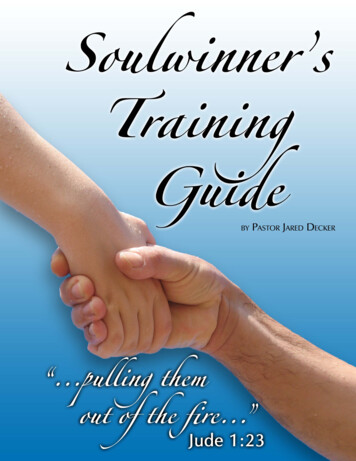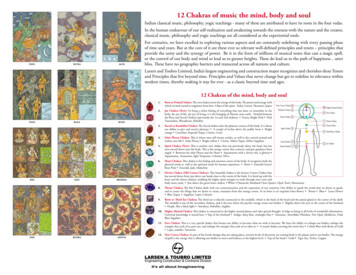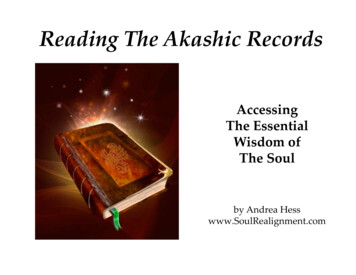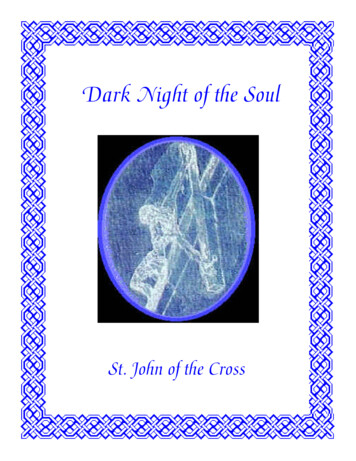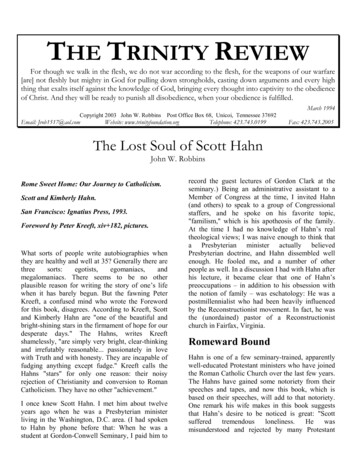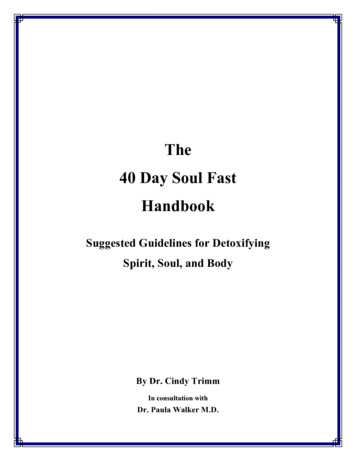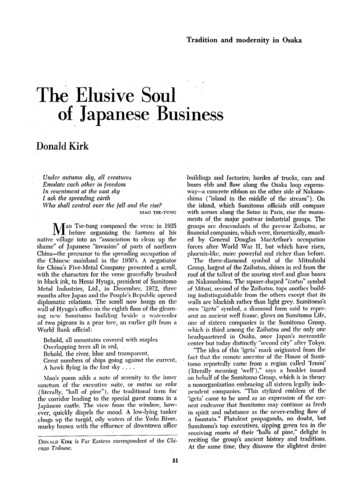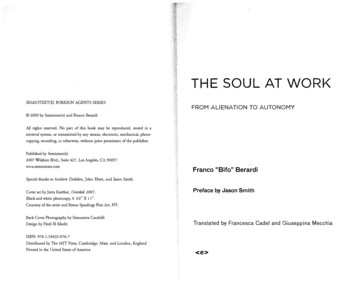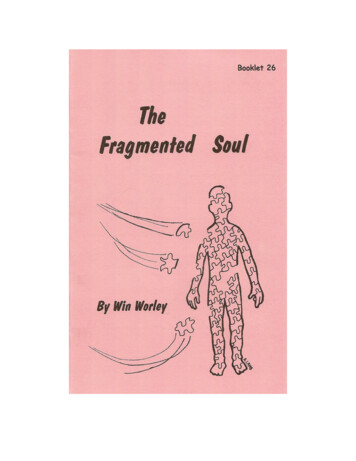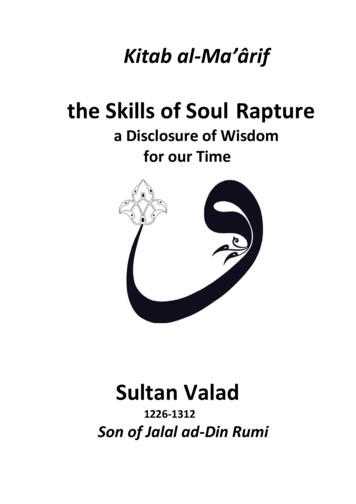
Transcription
Kitab al-Ma’ârifthe Skills of Soul Rapturea Disclosure of Wisdomfor our TimeSultan Valad1226-1312Son of Jalal ad-Din Rumi
2
Table of ContentsIntroduction – 5Introduction Sultan Valad - 9Action - 12Friends of God - 15Essence and Form - 26The Man of God - 46Soul - 50Creation - 60Spring, Paradise, Hell - 69Victory - 72Master and Disciple - 75Die Before You Die - 83The Caliph of God - 94Heart - 101Inner Meaning - 107Know Yourself - 112Justice - 124Like Attracts Like - 130Veils of the Worldly Means - 133Humility - 139Judgment - 149You Are What You Seek - 157Touchstone - 173The Alchemy of Mercy – 180Scholars - 185Inner being – 189Thoughts - 194Microcosm and Macrocosm - 1983
On Recognizing the Master - 201The Container and the Contained - 207Service - 209Knowledge - 211Visions - 213Impiety and Faith - 218Poems of Sultan Valad – 227The Eternal Spring - 2374
- IntroductionSultan Valad (1226-1312) was the son of Jalal ad-Din Rumi.Jalal ad-Din Rumi was born in Balkh in Khorasan in 1207. Rumi washimself the son of an eminent teacher, Baha-ud-Din Valad, whowas also called “the Sultan of the scholars”. It is in his memorythat his grandson, Sultan Valad, was also called Baha-ud-Din.In 1219, Rumi’s father had to flee from Khorasan because ofthe Mongol invasion. The family ended up settling down inAnatolia, at Konya, capital of the Seljuk Empire. This is where Jalalad-Din Rumi succeeded to his father as the head of a theologycollege. He taught there until his death in 1273.Jalāl ad-Dīn Rumi composed a considerable work, whichincludes the Mathnawi, the Diwan of Shams of Tabriz, Ruba’iyat,and Fihi-ma-fihi. Fihi-ma-fihi is a series of conversations of Rumiwith his disciples and friends that was collected by Sultan Valad.This book was originally called Maarif, which literallytranslates as Gnosis of better The Skill of Soul’s Rapture. It is aPersian prose work in a style approaching the spoken languageand containing accounts of Sulṭān Walad's thoughts and words. Itis composed of lectures given to his students explaining andreflecting his father’s material. The tone and material is very muchlike his father’s material collected in Fihi-ma-fihi, but Maarif is lessspontaneous, more elaborate, more explicit and less dense. Itsform is less diversified as it includes only a few interlocutors,discussions and questions. It is obvious that, in Kitab al-Maarif,Sultan Valad reflected on his father’s teaching and expanded onwhat he thought to be especially important. It is also interesting tonote that Maarif was also the title of the book by Sultan Valad’sgrandfather - who was his namesake. This book was recently5
translated into English under the title The Drowned Book: Ecstaticand Earthy Reflections of Bahauddin, the Father of Rumi byColeman Barks and John Moyne.Nobody was able to transmit the essence of Rumi’s teachingbetter than Sultan Valad. He was not only Rumi’s elder son; hewas also his dearest confidant. From six years old he would attendRumi’s meetings with disciples. When people desired a favor fromRumi, they would ask Sultan Valad to be their intercessor. In hisvarious writings and lectures, Valad ciphered many of crypticsymbols of his father’s behavior, actions, hints and indications. Healso explained many of his father’s mysteries. This was carried outthroughout his life in the forms of prose, poetry and discourses forhis disciples. Valad was also familiar with Shams Tabrizi (Rumi’sbeloved mentor) and used to associate with him regularly.It is said that one day Rumi was speaking to his visitors aboutMoses’ stick. According to the Koran, the stick swallowed up thecreations of the Pharaoh’s magicians, while the length of the stickneither augmented nor decreased by a single atom. Rumi asked,“How could I explain this incomparable parable so people canunderstand it?” And, turning toward Sultan Valad, he asked him tocomment on the verse. Sultan Valad bowed and said, “Thisparable is like a man who has an extremely big palace that is incomplete darkness. Suddenly, someone brings a torch and itspresence lights up the palace. The torch neither diminishes noraugments, but the darkness disappears.” Rumi congratulated himand said he was delighted with the answer.Once Rumi told his son, “O Bahâ-ud-Dîn, my coming into thisworld happened to prepare yours; for all the words I say arediscourses, but you, you are my action.”6
The text of the original Maarif is taken from the Persiancollection by Najib Mayel Heravi, who compared, collected, andcompiled five different editions of the book. The version that weused is the smallest in size of the 5 editions, and has the most incommon with all of the other versions. The French and Spanishtranslations have also been used in the preparation of the presentedition. Every effort has been made to preserve, in itsunattainable form, the teaching that it contains.In Sufism, ma'rifa describes the mystical intuitive knowledgeof spiritual truth, or better the skill of soul “rapture”achievedthrough ecstatic experiences, rather than revealed or rationallyacquired.A seeker of ma'rifa is called 'arif', the one who "knows".In one of the earliest accounts of the Maqamat-l arba'in("forty stations") in Sufism, sufi master Abu Said ibn Abi'l-Khayrma'rifa lists as the 25th station: "By all creatures of the twoworlds, and through all people, they see Allah, and there is noaccusation of their perception. "Marifat is one of the 'four doors' of Sufism:Sharia: legal path.Tariqa: methodical-esoteric path.Ma'rifa: soul rapture, mystical knowledge, consciousness.Haqiqa: mystical truth / truth.A metaphor for explaining the meaning of ma'rifa is to collectthe pearl. Shari'a is the boat; tariqa is represented by the rowingof the pearlman; haqiqa is the pearl; and ma'rifa is the ability tosee the difference between real and false pearls.7
8
- Introduction of Sultan ValadBismillah ir Rahman ir RahimIn the name of God,the Most Gracious,the Most Merciful.All the Prophets and Saints are known and distinguished byvirtue of the miracles and prodigies that they perform. The Sagesand the Seekers of Truth say that God has bestowed a specificgrace upon each one of them. What He has granted to one, He hasnot granted to another. He has given to each a different dominion,a separate world. My grandfather used to say that each Prophetwas capable of performing any miracle, and that they possessedall powers. But God conceded to each one an Attribute accordingto the needs of the moment to satisfy a specific need or desire.For instance, a sage may know medicine, astronomy and othersciences: but when he treats a patient, we cannot affirm that heonly knows the art of medicine. According to the circumstances hewill show one aspect of his knowledge that he has mastered. Or, ifa person who is concurrently an expert goldsmith, cobbler andtailor is sewing garments, we cannot say that he only knows thatspecific craft. Or still, if a river powers a water-mill, a sensibleperson would not say that it is the only function of the river; it iscapable of many other things such as washing clothes, refreshing,9
turning gardens green again, and contributing to the growth ofplants and flowers. But in that specific instance, it is necessary tomove the wheel of the mill; and in a garden or field it could beseen to provide other services.Therefore, each Prophet is capable of accomplishing anymiracle, but he performs miracles and prodigies according to theneeds of his people.The prophets are manifestations and instruments of God.They are extinguished and annihilated in Him. Through them Godshows everything. Therefore, how is it possible to assert that Godis not capable of doing everything? God is the active principle; theProphets are like a pen in the hand of the writer. Each mark thatthe pen draws is, in fact, written by the writer. They are like thebow and the arrow. It is not the bow that shoots the arrow, butthe archer. That is why God, the Most High, has said: “When youslew, it was not you who slew, but God.”God is literally saying: “Mohammad, that arrow that you shot,it is Us who shot it not you. Everything you do is by thecommandment and mandate of God. What then is your role?Since it is Us who Act and everything is done through Our Desireand Will, he who fights and struggles against you, fights andstruggles against Us; he who follows you and acts upon yourcommands and manifests friendship and love for you, has donethose things toward Us.”10
11
- ActionSomeone said, “The most important is action; words are notimportant.” I said, “I too would like to find someone who knowswhat action is and can see, so that I can show him action.” Now,you like words. One can converse with you since you are not aman of action. How could you comprehend what action is? Asaction you only understand prayers, fasting, reading spiritual texts,pilgrimage, alms, meditation, and devotion. But all these are notaction. These are the means to reach true Action. It is possible thatwhen you perform these activities they exert some influence overyou and transform you in relation to what you were before. Forexample, prayer allows one to distance oneself from sin and error.Action, on the other hand, purifies your faults. When you are in astate of impurity you have not accomplished the prayer.So all these different forms and modes do not constituteAction. Action is the transmutation of the heart, passing from onestate to another. Like the seminal liquid and the embryo passingfrom one state to another in the mother’s womb; first a clot ofblood, then a fetus, then the face of a man who is endowed withlife, enters the world and grows up. This transformation andgrowth is action and ascension.The meaning of Miraj (Mohammad’s journey to heaven) isthe same as we have just mentioned. The seeker passes from oneinternal state to another. The second state is higher than the first;the third is higher than the second, ad infinitum.Anyone who, in the bazaar of this world - because “This worldis the field which is reaped in the other world” - remains two daysin the same state suffers a loss. Day by day, second by second, it isnecessary to rise and advance. This is the reality of action. Whoperceives such action? With the exception of God, no one knows it12
or can see it. “My saints are under my dome; except I, no oneknows them.”In a word, knowledge is closer to real action than personaleffort and corporal practices such as prayer, fasting, and the rest.Since it is possible for knowledge to be separated from action andbe rendered useless, it is even more possible that personal effortand corporal practices, since they are further away from realaction, are rendered even more useless. Hypocrites performexternal practices such as prayer and fasting, but cannot traversethe path of faith and declare the existence of God. If theypossessed the knowledge and ability they would not bemiscreants. Therefore, everything that was said and indicatedconcerning the different modes and ways, gestures and devotionsthat are practiced and recognized are the means of real action, butnot action itself.Iblis (The primary name of Satan in Islam) performed practicesof devotion in heaven for thousands of years. If his externalpractices had been real, he would have behaved differently whenGod ordered him to prostrate himself before Adam.Jesus did not perform external acts, but practiced true actionin such a way that he was able to evolve from a state of spiritualinfancy to spiritual maturity. What Jesus declared in the cradle(“Truly I am the servant of God; He has given me the Book and hasmade me a prophet.” (Sura 19, verse 30, Mohammad achieved itwhen he was forty years oldThus, the reality of action resides in your transformation andprogress at each instant. When the philosopher’s stone grazescopper, it is the transmutation of copper into gold that constitutesreal action. A piece of copper may be hammered, boiled orextended, but it will still remain copper. Those who are not13
capable of recognizing gold and perceive the external form ofpractices say, “If gold exists in the world, it is that which has beenhammered and has become wide and long.” But he who knowsgold examines the metal with the touchstone and will not buy it,even for half a cent, if it is not pure gold.I, who am God, do not look at your faces, or your behavior oryour words, but I set my eyes upon your hearts in order to knowthe degree of love you have for me.For a wise man, one indication is sufficient. Or put in otherwords, “if there is someone home, only one word will suffice.”14
- Friends of GodThe Friends of God are the Attributes of God and His chosenones (These Attributes are such things as All-Seeing, All-Hearing,All-Powerful. All together there are 99 of them, commonlyreferred to as the 99 Names of God) ; not God himself, but theyare the Secrets of God. Knowledge and awareness of God is easierthan the knowledge of his Secrets. Likewise, if you wish to knowsomeone, you get acquainted and spend some time with him. Thisdesire to know him can be accomplished with little effort. But ifyou desire to gain the inner secrets of his heart, greater effortswould be needed. We may conclude that it is easier to learnappearances than to obtain inner secrets.If someone wishes to visit a Master and be received by him,after a few attempts and with some effort, he may succeed. But ifhe wishes to have access to the knowledge of the Master, then hemust dedicate many years and much effort to gain a piece of thistreasure.In a city, there are one hundred thousand God-believingpeople. All of them crave that God grant them their desires. Theyconsider God to be the Unique, the Almighty, the Generous, theTeacher, the Guide, He who forgives and He who punishes. Theysubmit to Him with sincere heart and soul and worship Him. Ingeneral, they are like this: some are strong in action, some areweak; some have little knowledge of God and some have much.But among these hundred thousand people, only a smallcommunity incline toward a true Saint. Among that smallcommunity, only one or two truly know that Saint.15
After this discussion, it is clear that worship and knowledge ofGod is common. In general, everyone, without exception, canfollow the Path of Knowledge. Even the heedless worship God.Impiety and faith, both travel His Way saying, “He is Unique,the One without associates.”Men worship God in various forms, practices and languages.But worship is not exclusive to man. Even the heavens, the sun,the stars, the moon, the earth, minerals, mountains, stones, dust,air and fire - everything worships and praises Him in a languagethat you do not know or understand.To ensure that not everyone will pray to God or return to Him,all created beings are the screens and courtiers of God. Theexquisite delicacies, silk garments, beautiful women, and otherriches of this world prevent the elect from serving and seeing God.These things are like highwaymen to the seekers and those whoare on the path - until by means of lamentation, prayers andremembrance - some of them escape from the brigands, andsuccessfully bring the loads and garments of the seeker toacceptance and submission to God. But it is God who guards theSaints of God, and makes it impossible for everyone to find orrecognize them, because it has been said that “my Saints areunder my dome; Except I, no one knows them.” That is, my Saintsand my friends are concealed under the dome of My Jealousy, inorder that no one, other than I, can see them or know them. As inthis world, when the great kings sit on the throne of justice,receiving both noblemen and commoners in their courts; hearingeach desire and granting requests according to rank. Still, thesepeople never see the sons and daughters of the king. And the manwho asks to become the confidant and companion of the king risks16
his head - unless the king, by his own volition and knowing theloyalty and faith of the person, makes him his confidant.Ungodly obstacles or brigand-like demons and devils can bechased away by means of recitation and remembrance. But withwhich recitation or which remembrance could we chase Godaway? Therefore it is obvious that finding Friends of God andknowing them is much harder than knowing God. Whoever knowsa Friend of God knows God, but the reverse is not true. Knowledgeof God does not necessarily lead to knowledge of the Friends ofGod, since there are many people who recognize and submit toGod but cannot know and understand the Truth. Even when theysee a Friend of God, they make enemies of him and reject him.Some sages, like Junaid(Junaid of Bagdad -d. 9107) and Shibli(Junaid’s disciple -d. 945), rejected Mansur el-Hallaj because of hisseemingly blasphemous outcry “I am the Truth” - and decided tospill his blood . They unanimously released an edict allowing thehanging of this unique and precious man. After his body was takendown from the gallows, it was burnt and his ashes dispersed onthe river so that no trace of him would remain in this world. It istold that, regardless of what was tried, the ashes would arrangethemselves on the surface of the river to form the words “I am theTruth”. They were all filled with rue after witnessing this wonder.Likewise for Moses, who was one of the Prophets andMessengers of God. Despite his knowledge and greatness, Mosessought to know Khidr (a mysterious character in the Islamictradition who was the guide of Moses, and often called ”TheGreen One” Also thought to be the Prophet Elijah) and imploredGod to be able to meet him. After many prayers and lamentations,his supplication was granted. God said, “Start a journey and seek17
Our pure servant so that you may find him.” He found Khidr at theseashore. His eyes and his heart were enlightened by thisencounter, and he achieved many goals from this single meeting.For, “God, the Most High, has servants. When they gaze upon theother servants, they cover them with the mantle of prosperity.”One glance of Khidr invested Moses with such robes of honor andso much blessing that, “the eye has not seen, the ear has notheard, and nothing has passed through the heart.” (Hadith of theProphet).Desire for the friendship and company of Khidr sprung inMoses, without ever seeing him or experiencing his presence:You have not been visible to us, So we are in this state.Woe to us, if You became visible.Khidr said, “O Moses, be satisfied with everything you haveseen in us and leave, for sharing the road with us is dangerous. Itwould be better that you did not take the risk, because there aremany dangers.” But Moses complained with sincerity and love.After they were together for some time on their route, they founda ship on the seashore. The ship had no equal in its beauty andcraftsmanship. However, Khidr made a hole in it so that it becameunusable. Moses said, “What you have done is not right, since it iscontrary to wisdom and to the law. If the touchstone of justicewas applied, this act would not be found of good value, and on thescale of fairness and the law it would reveal itself as wrongful.”Khidr answered, “Did I not warn you that you should notdisagree with me?”18
Moses apologized, “I have forgotten our pact. It is my firstfault, but forgiveness is better.” And he wept much until Khidrforgave him.After some time had passed, they arrived on an island. Amongthe children of that island there was a beautiful, graceful andsweet child. Khidr gently took the child’s hand and walked awaywith him. Moses was puzzled and followed Khidr and the child.When they arrived at a solitary place and out of the sight ofpeople, Khidr put the child under his foot and slit his throat. Mosesprotested vehemently and cried out, “Where is the fairness inending the life of a pure and innocent child?”Khidr answered, “Did I not tell you to turn away and not comewith me because you would not have endurance to witness orunderstand my actions?”Moses came back to his senses and said, “I committed a fault;forgetfulness overcame me.”Khidr said, “You are so impertinent! Each time you questionmy acts, then you say that you have made a mistake, and thatforgetfulness has overcome you.”Moses said, “For Love of God, forgive me once again, for it iscustomary to forgive three times. If I argue again, do not acceptmy excuses.”If a fault again you see in me, Do not aid in my adversity.Khidr excused Moses a second time under the condition that,if he should commit a third fault, they would part regardless of anypretext or excuse. They traveled together for some time. Bychance it happened that they did not find any food for severaldays and were close to dying of starvation. In this state ofdeprivation, they came upon a vast island where they saw a large19
city and a large crowd of people. They noticed a wall on the vergeof collapse due to a hole in it. Khidr repaired and rebuilt the wall.When Moses saw what had happened, he was sure thatfinally, after so much misery and hunger, food, gifts and moneywould soon come to them in great quantities. But Khidr tookMoses by the hand and walked away. Moses lost his patience andcried out, “O, Khidr! We are hunger-stricken. You raised a wall thatnobody could repair, and the owner of this house is extremelyrich. At least you could have asked for a wage which would haveallowed us to eat for a few days. Even if you had renouncedeverything you could have asked for a piece of bread so that wecould eat. Your action is contrary to law and justice and nonecould agree with it.”Khidr said, “O Moses! You have committed three faults.However, I will explain to you the three cases that provoked yourprotests so you may know that these actions were worthy ofapproval rather than condemnation. Otherwise, I would not havedone them.”“The reason I made a hole in the ship, even though itbelonged to poor and decent people, was that I saw with my innereye that tyrants had the intention of taking the ship and using it toattack good men. Therefore, I destroyed the ship and rendered itunusable.”“The reason for the murder of the child was that in later life,the boy, who was ill natured, would have behaved in such a waythat his parents would have failed in the way of God. I wanted hisparents to be able to attain the perfect end and not go astraybecause of their son. It is like a gardener who prunes the diseasedbranches so that the other branches may acquire strength.”20
“I restored and straightened the wall that was ruined to thepoint of collapse. The wall belonged to rich orphans. I did not askfor money or recompense because their father was a Servant ofGod.” The commentators of this story note that in the seventhgeneration of those orphans there was a righteous man. Othersassert that there was a good man in the seventieth generation.Thus, a man like Khidr - to whom belongs not only the treasure ofthe other World, but who is himself a source of generosity - acts tobenefit the ancestor of the seventh or the seventieth generation.Out of respect for the descendants, he performed anextraordinary service that no one else could have done. Althoughhe himself was in great need and difficulty, he did not accept anycompensation.Khidr explained the essence of the wisdom of these threesecrets to Moses - and they parted.A descendant of Ali (Ali was the cousin and son-in-law of theProphet) fell drunk in the bazaar in the city of Tabriz. His head,face and beard were soiled with vomit and dust. A devout dervish,who saw him in this state, insulted him and spat on him. Thatsame night, the Prophet appeared to the dervish in a dream, “Youallege to be at my service, following and submitting to mytradition, hoping to be among those who will enter paradise. Butwhen you saw me covered with vomit in the middle of the bazaar,why did you not wash my filth and lay me down as expected fromthe servants who attend their master? Not only did you not serveme, but your heart allowed you to spit upon me.”At this moment, the dervish said to himself, “When did I dothese things to the Prophet?” The Prophet immediately answered,“Do you not know that our children are our most precious21
possessions? If it was not so, how could they inherit thepossessions of their father?” The dervish awoke with a start andset out to search for the man. He brought him to his home andgave him his house and half of his possessions. While he lived, heremained at his service and attended him with great respect.In emphasis of the preceding, it is told that one sufi said toanother, “Each day, God the Most High, manifests Himself to meseventy times.” The other answered him, “If you feel so muchbravery, go and see Bayazid.” After some time passed, the sufi saidagain, “I see God seventy times a day.” And the other repeated, “Ifyou have so much bravery, go and see Bayazid.”Since this affair lasted for a long time, the sufi at last decidedto visit Bayazid, who was living in a forest. Bayazid intuitively knewthat the dervish was coming to visit him, and came out of theforest to meet him, and next to the forest their meeting tookplace. At the moment the dervish perceived Bayazid and saw hisblessed face, he could not bear it; at once, he gave up his soul andleft this world.Let us consider the profound meaning of the forest. The forestrepresents the interior of Bayazid, and the trees in the forest arethe thoughts, knowledge and spiritual rank that he held in hisheart. When the Sufi arrived at the place of Bayazid, how could hehave entered the forest and then walked back out? Bayazid had tocome out of the forest so the Sufi could see him.Likewise, when an intelligent man speaks to a child, he mustcome out from the “forest” of his own intelligence and knowledge,and speak to the child accordingly. In this way the child mayunderstand. “Speak to people according to the degree of theirunderstanding.”( Hadith of the Prophet)22
The sufi perceived God according to his own capacity. Butwhen the Light and Splendor of God shone upon him through thedimension of Bayazid, he could not bear it and was annihilated.Gabriel received the Light of Divine Radiance and obtained hissustenance from it. He was, like a fish, eternally immersed in theocean of Divine Union. When he escorted Mohammad toward Godduring the Mi’raj, he went together with him as high as his ownrank would allow. When they arrived at this superior place, hestopped and remained immobile. The Prophet said, “Come, whydo you remain there?” Gabriel answered, “I cannot go further for Iam not permitted. If I advance a single step more I will be burnt.”The Prophet continued alone and contemplated Divine Beautywith the inner eye.Anyone who sees God, from an ant to Solomon, sees Himaccording to his own capacity. All things are nurtured by God, andall life and existence derive from the Manifestations of God. Butwhere are the manifestations of Solomon or the ant?A master has ten slaves. One of the slaves is five years old,another is ten, another is thirty, another is fifty, and yet another issixty years old. All of them are at the service of the master andshow him submission. However, the service of some is superior tothe service of others. The master talks to each of them, but inaccordance with their capacity he maintains a differentrelationship with each of them. If he would behave in the sameway with the youngest as with the oldest, the youngest could notendure it.The garment is tailored to fit the man.Equally, God manifests himself to the believers and the Saintsin accordance with their spiritual rank. The Light of God descendsupon them in a manner that they are able to endure. When a man23
wants to unite with fire, he heats up water in a bath. He uniteshimself with the fire through the intermediary of the water. If hewere to walk directly into the fire, he would be burned. However,the Perfect Man finds himself in the fire like a fish in the water.The other seekers and believers lack the necessary strength tobenefit from the fire without the intermediary.What we are saying here is that it is easier to recognize andknow the Friends of God than to know God without theirintermediation. It does not mean that the Friends of God aredifferent from God; such an allegation would be erroneous. Butyou cannot see God with the same power as that with which theFriend of God contemplates Him. Therefore, go and seek theFriend of God, so that through his intermediary, you may see whathe sees - and God knows best.24
Al Khidr25
- Essence and FormSomeone remarked, “We have seen some dervishes devotingthemselves to the whirling dances, and playing musicalinstruments such as the reed. How is it possible that such activitiesare permitted by the rules of the dervishes? Is it advisable for adervish to act in this way?”I said, “Our answer will be detailed. If there is a sinceredervish who engages in different striving, seeking, ritual prayer,fasting, retirement and remembrance, and has been seeking Godin this manner for years, and as a result has gained a spiritual state(hal) and vision (zawq); furthermore, he has evaluated thesepractices according to the internal balance, and found that hisparticipation in the dance or listening to music has intensified hisspritual state and vision; in such a situation, the spiritual guidemakes it permissible for this dervish to practice the dance andlisten to music. This is because his goal is to bring himself closer toGod and not to seek pleasure.Note:- Hal: a spiritual state that is temporary and comesgratuitously without any effort or inducement, and when itdoes come, the characteristics of the Self go intosuspension. If this state endures and become a permanentcharacteristic, then it is called Maqam (rank)- Zawq: Literally, tasting. This word refers to the first step ofthe vision of Truth which are minor traces of illuminationsometimes referred to as Lightning.But if during the prayer, the same spiritual state befalls him,then he has reached the goal by better means. In such a
Sultan Valad (1226-1312) was the son of Jalal ad-Din Rumi. Jalal ad-Din Rumi was born in Balkh in Khorasan in 1207. Rumi was himself the son of an eminent teacher, Baha-ud-Din Valad, who was also called the Sultan of the scholars. It is in his memory that
